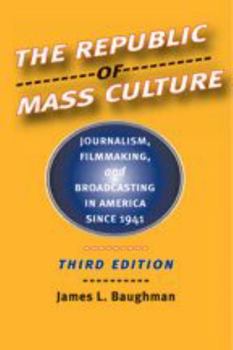The Republic of Mass Culture: Journalism, Filmmaking, and Broadcasting in America Since 1941
Select Format
Select Condition 
Book Overview
The new edition of James L. Baughman's successful book The Republic of Mass Culture examines the advent of television and the impact it had on the established mass media--radio, film, newspapers, and magazines. When television captured the largest share of the mass audience by the late 1950s, rival media were forced to target smaller, subgroup markets with novel content: rock 'n' roll for teenage radio listeners in the 1950s, sexually explicit films that began to appear in the 1960s, and analytical newspaper reporting in the 1970s and 1980s. The growing popularity of cable TV posed new complications, especially for network television. The capacity of individual media industries to adapt not only determined their success or failure but also shaped the content of their products. Two new chapters examine media entrants like Fox News, technologies such as the Internet, and increasing industry concentration. Baughman discusses significant changes in media economics and audience demand that are having profound effects on radio program formats, television news coverage, and the very existence of newspapers. Carefully drawing on interdisciplinary communication research, The Republic of Mass Culture presents a lively analysis of the shifting objectives and challenges of the media industries.
Format:Paperback
Language:English
ISBN:0801883164
ISBN13:9780801883163
Release Date:January 2006
Publisher:Johns Hopkins University Press
Length:320 Pages
Weight:1.01 lbs.
Dimensions:0.8" x 8.9" x 6.0"
Grade Range:Postsecondary
Customer Reviews
2 ratings
Superbly written yet sober account
Published by Thriftbooks.com User , 20 years ago
For those interested in how television became the hegemonic force in mass culture since WWII, this is the book to read. Be prepared though; his style of writing seems to cater to an informed, educated audience, so to the casual reader Baughman's writing can be enervating and taxing. Yet do not be discouraged because as you get further along in the book, it becomes more of a rewarding read. I found the section on the decline of the print media, in particular the national general interest magazines such as Life and the Saturday Evening Post, most interesting and informative. Of secondary interest to me was the gradual development (or devolution) in American television taste from highbrow fare such as the Sid Caesar Show to lowbrow shows like Charlie's Angels. Guess which achetype was more successful... The topic is penetrating because it provides a revealing backdrop for how Americans developed their personal (middlebrow at best) tastes, recording a kind of 'living room' history of the past sixty years, rather than the typical top-down politico-socio-economic history prevalent in your history textbooks. This book has informed me to correlate certain pop-culture tastes with political and social preferences. For these reasons I suggest Baughman's work.
a clear summary of the history of our media culture
Published by Thriftbooks.com User , 26 years ago
Baughman's book is a joy to read because of his skillful writing. This is an ideal eaxample of how to write a book of this sort. Every point he makes is worth making and is increadibly clear. He never repeats his points and covers a great deal of territory. I definitely recommend this book to any student of American history, media studies or consumer culture.






